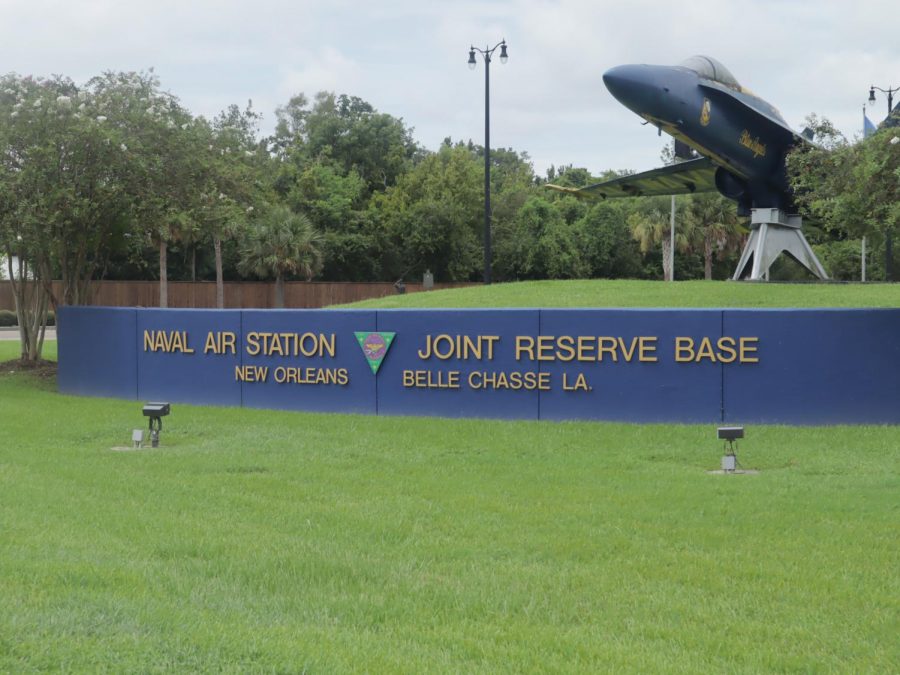OPINION: Why F35s in Belle Chasse are good for national security
A plane rests behind a sign located just outside of the Naval Air Station Joint Reserve Base in Belle Chasse, Louisiana. This is one of the locations where F35s are being considered to be placed.
September 4, 2022
Some may find it odd to support the addition of arguably the world’s most effective jet stealth fighter to the arsenal in their community.
The U.S. military is in the process of deciding which of four bases in the nation will be give one or more squadrons of F-35 airplanes. In the running are three sites in California and the Naval Air Station Joint Reserve Base New Orleans, the last named in Belle Chasse and locally called Calendar Field.
A public scoping period is set to allow citizens to voice their opinions on where these airplanes will be placed. There are three ways one can share opinions: 1) attending live public hearings, 2) virtual meetings, and 3) written statements. It is especially important that citizens learn about potential local environmental impacts from these changes.
To my knowledge, there was only one notice of these hearings in the local newspaper, and it appeared very close to the public scoping meeting.
Anyone who made contact with the Department of the Air Force with comments will have their information considered during the Environmental Impact Statement process.
Anyone with opinions to share can contact the DAF and their communication will be considered before final decisions are made – it is not too late to express your views.
It appears the F-35 jets will be assigned to the chosen military base via their state National Guard and the U.S. Air Force.
I support the placement of F-35 fighter wings in Belle Chasse, Louisiana.
My comments refer to the national security issues associated with New Orleans being the most important port system in the United States. The Port of New Orleans is strategically the most important conduit for the economy of our nation, and we must stress the need for rapid and effective protection for this region.
An attack on New Orleans will negatively impact a) access to offshore oil, b) access to and the operation of the Strategic Petroleum Reserve, c) protection of the Mississippi as the aorta of commerce into the heartland of the USA, and d) one of two major chemical corridors producing the building blocks of most chemical products used in the U.S.
Most people focus on the importance and value of larger cities such as Washington, D.C., New York City, Los Angeles and others as being first targets in our nation.
As stated above, I think an enemy attack on New Orleans will immediately stop movement of commodities from the nation’s heartland and the national flow of American oil and gas!
After Hurricane Katrina, economists estimated that each day the Mississippi River is not operational (as in a chemical spill, a collision, or a hurricane) the U.S. economy loses $300,000,000 dollars.
It does so by breaking the supply chain for food, energy, commodities entering and exiting the country – and it affects the well-being of each and every citizen.
In the Civil War, the Union immediately recognized that their first military step was to capture New Orleans and take its prosperity and river access out of the war.
The project was named “Anaconda” to mentally and visually illustrate the constricting pressure such a move would place on the supply chain to the Confederate war effort.
In World War II, the Germans placed submarines at the mouth of the Mississippi River and put a huge dent in the movement of war supplies to both Europe and Asia.
History tells us we need the best-of-the-best in air protection in and around New Orleans. The F-35 addition to or replacement of our existing F-15 presence will be a brilliant strategic move for national security.
The biggest lesson we’ve recently learned is how swiftly aggressive military nations can change the path of global security.
A strong defense for our most strategically important areas must be a national imperative.








